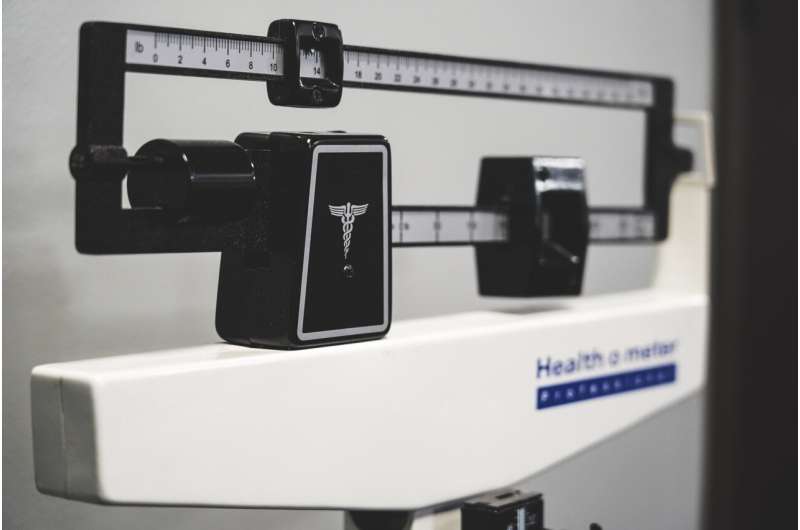This article has been reviewed according to Science X's editorial process and policies. Editors have highlighted the following attributes while ensuring the content's credibility:
fact-checked
trusted source
proofread
Older weight loss drugs are in demand. But are they safe or effective? And should you take them?

With Ozempic-type weight loss drugs in short supply, more people are turning to old-school weight loss drugs such as Qsymia and Contrave, which come in pill form but also include serious warning labels.
Savanna DiCristina, a Northeastern assistant clinical professor of pharmacy and health systems sciences, has witnessed the increased demand for the older class of drugs as a pharmacist at a health clinic for older, low-income adults in Brockton, Massachusetts.
She says that while Qsymia and Contrave have less of a dramatic effect in promoting weight loss than GLP-1 receptors such as Wegovy and Ozempic, their lower cost, availability and the fact they don't require injections makes them an attractive option for some people seeking to manage their weight.
"There's definitely an increased interest," DiCristina says, which she attributes to shortages of GLP-1 receptor medications, even for people with diabetes, as well as to the reduced stigma around using drugs to manage weight loss.
Just be sure to heed the warning labels, DiCristina says. Qsymia is known to cause birth defects, while Contrave comes with a "black box" warning label for the risk of suicidal thoughts and behaviors.
Combination drugs
Both Qsymia and Contrave combine two different medications for a weight-loss effect, DiCristina says.
Qsymia, approved in 2012, combines an old stimulant, phentermine, with topiramate, an anticonvulsant medication. Both drugs have weight loss as a side effect, DiCristina says.
Contrave, which has been around for 10 years, is a combination of the antidepressant bupropion and naltrexone, an opioid antagonist designed to combat cravings.
"We think that naltrexone works (to reduce) the reward aspect of eating," DiCristina says, adding that bupropion, which is known under the brand name Wellbutrin, has weight loss as a side effect.
Effective, but less so than Ozempic
DiCristina says that both Qsymia and Contrave are effective in helping patients lose pounds, but they do not promote as much weight loss as GLP-1s, the newer class of drugs used for diabetes and weight loss.
The data for Contrave shows a 4% to 5% reduction in total body weight over a year, while Qsymia is around 7% to 9%, she says.
"What you're really looking for for effective long-term weight loss is somewhere between 5% and 10%," DiCristina says. "They are hovering at that threshold."
Ozempic, on the other hand, can reduce total body weight by 10% to 15% over the course of a year.
Ozempic was approved in 2017 to treat type 2 diabetes in adults but is sometimes prescribed off-label for weight loss.
Other semaglutide GLP-1 receptor agonists such as Wegovy, approved in 2021, are prescribed for weight loss. They work by slowing the movement of food from the stomach into the small intestine, which appears to curb hunger so people eat less.
Black box and birth defect warnings
While GLP-1 medications provide cardiac health benefits, Qsymia is contraindicated for anybody with a history of cardiac disease, DiCristina says.
In addition, she says that women of childbearing age have to take a pregnancy test before they start Qsymia and every month during the course of their prescription because the topiramate component is associated with serious birth defects.
Contrave has a warning label addressing the risk of suicidal thoughts and behaviors, which DiCristina says is known as a "black box" warning because the alert has a black box around it to capture the user's attention.
"It's the highest risk the FDA can impose on drug labeling," she says.
The bupropion component is known to increase the risk of suicidality in teens and young adults, but even some adults in clinical trials reported suicidality, DiCristina says.
With Contrave, "we're giving psychogenic agents to people who don't necessarily have any psychiatric disorder," which could play into reports of suicidal thoughts, she says.
Who are candidates for older weight loss drugs?
"The GLP-1s are still preferred for weight loss because they have the least risky side effects and the least amount of contraindications," DiCristina says.
"People who are contraindicated for GLP-1s are going to be those who are at really high risk of pancreatitis, or who can't or won't do injections, or who have cost barriers," she says.
Wegovy can cost more than $1,000 a month without insurance or coupons. Contrave advertises its pills at $99 a month through a CurAccess program.
"There's a place for both" GLP-1s and the combination drugs, DiCristina says, adding that Qysmia appears to help people with migraine symptoms and Contrave helps with depression as well as weight loss.
Broadening the conversation around weight loss
"It's definitely a smaller place" for Qysmia and Contrave, due to their side effects, she says.
The increased interest in older weight loss drugs also can be attributed to the increased acceptance of weight-loss drug management due to the conversation around GLP-1s, DiCristina says.
The new messaging is that "once lifestyle modifications aren't working, it's OK to start using these drugs," she says.
"We're finding patients are a little bit more willing to have that conversation now."
This story is republished courtesy of Northeastern Global News news.northeastern.edu.




















